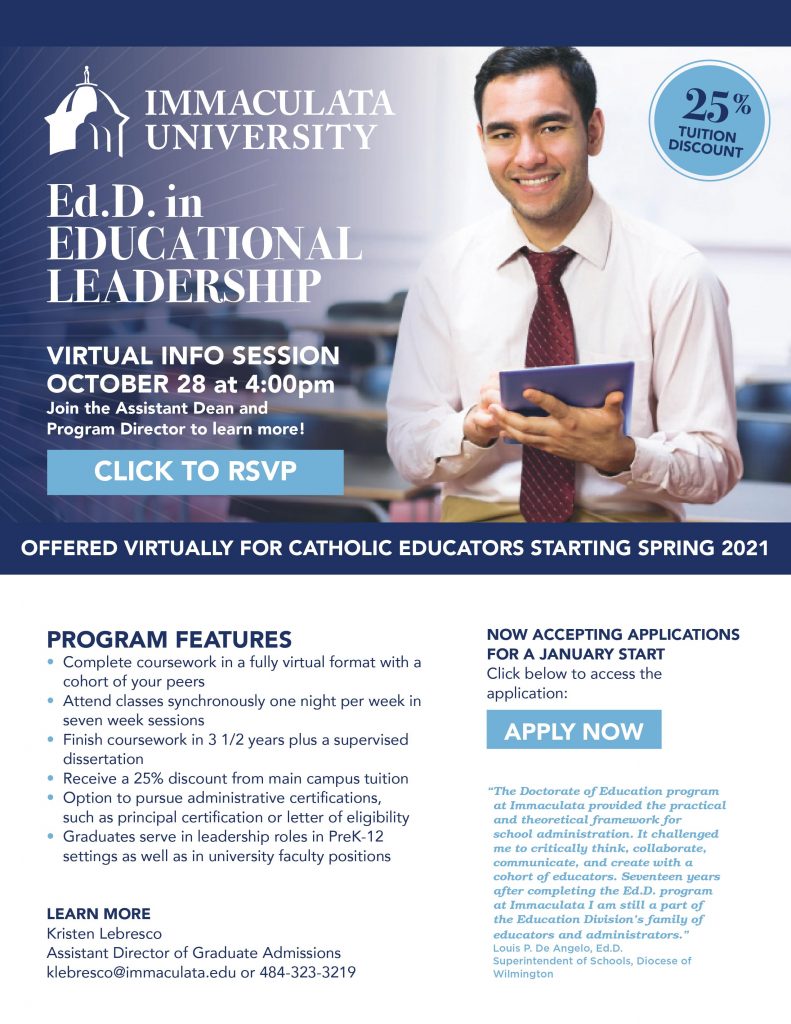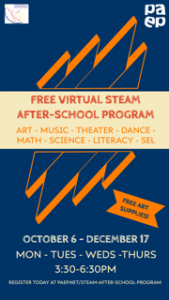Latest Updates
Option C – Progress Report and Online Publishing of Progress Reports
Posted: October 8, 2020In preparation of progress reports, please see the two Option C direction sets for elementary schools. If schools have any questions, please submit a ticket through the support tab.
Memo from Dr. McLaughlin – CSO Lessons Learned
Posted: October 7, 2020The CSO committee continues to meet weekly. The focus has shifted to deal with issues our schools are currently dealing with related to COVID-19. This week’s meeting focused on “Lessons Learned”.
Principals provided some valuable lessons that many of you may have already implemented, but if not we will share them.
The first deals with Contact Tracing. One important lesson is to have seating charts, class lists and bus lists available for different activities. I know that teachers may provide them for classes, but knowing where students sit on the bus, where they sit during lunch and activities, such as Mass, is very important. Knowing this information could prevent an entire cohort quarantine and limit it to just a few students. In addition to having these at school, it would be helpful to have access to them from home, as well. We have had many cases when the identification of a COVID-19 case occurred on a weekend.
One school reported that for large activities, such as mass, students are seated alphabetically for ease of identifying where students are seated.
The second issue deals with Reporting a Suspected Case. We have found that it is best if the principal handles the contact with the Department of Health. They tend to be more responsive and we have found that making decisions regarding who to quarantine is best when the principal gets the information directly, rather than through a nurse or a member of your COVID-19 team.
We are also looking to put together a letter to help remind parents that they need to be vigilant with activities outside of school.
Immaculata University – Ed.D. in Educational Leadership
Posted: October 7, 2020Launching in January 2021, we are happy to share with you that Immaculata University will be offering the Ed.D. program to Catholic Educators/Administrators in a cohort setting, fully online, synchronous and at a 25% discount. A virtual information session will be held October 28 at 4pm. Please see the flyer below for more information.

Navigating the Challenges of Teaching the 2020 Election
Posted: October 6, 2020Teacher Induction – Levels I & II Processes
Posted: October 6, 2020Level I and II Induction processes have been posted. Please note that during this COVID time, the turnaround may take longer than usual.
- Level I Induction: Documents Needed / Procedures to Follow
- Level II Induction: Documents Needed / Procedures to Follow
STEAM – Free Online After Schools Program
Posted: October 2, 2020Contact: Andrew Moran | Sister Lauretta Linsalata | 215-637-1800 ext. 6013
Archbishop Ryan High School
We would like to announce the virtual free after school STEAM program, sponsored by the Philadelphia Arts in Education Partnership. The program is being taught by qualified arts teachers.

2020 Commonwealth Citizenship Challenge
Posted: October 2, 2020Contact: Beth Specker, Executive Director, Rendell Center for Civics and Civic Engagement
On behalf of The Rendell Center for Civics and Civic Engagement, I am happy to invite you to enter your class into the 2020 Commonwealth Citizenship Challenge. Due to COVID 19, this year’s Challenge is an essay contest only – with no in-person final presentations. But the contest does provide an excellent opportunity for you to explore the election and the electoral college with your students.
This Year’s Challenge Question: “Should the Constitution be amended to eliminate the Electoral College system for selecting the President and be replaced with the national popular vote?”
As you know, the Challenge is a unique opportunity for 4 and 5th grade classes to express themselves by answering a civics essay question regarding a current issue facing our democracy. Classroom teams and individuals are asked to write an essay that addresses their point of view on the assigned issue. Teams take one position and defend their argument in a concise written document of a minimum of 300 words. The contest is drawn from PA Civics standards relating to principles and documents of government; rights and responsibilities of citizens; and information on how government works. From all entries submitted ten finalists will be selected and invited to read their essay on PCN in December. This years contest is open to schools from across the Commonwealth.
Annual Prizes
- 1 GRAND PRIZE of $1,000: The first place school will receive a check to be used toward a program that promotes civics learning and engagement across the student body.
- 4 RUNNER-UP PRIZES of $500: Each of the three runner-up schools will receive a check to be used toward a program that promotes civics learning and engagement across the student body.
Now is the time to get your 4th or 5th grade class involved! Our submission deadline is November 1, 2020.
The Rendell Center looks forward to receiving your 2020 submission.. If you have any questions or need additional guidance, please email me directly at bspecker@rendellcenter.org. Email me for lessons to help you begin your discussions. Please check out our new Presidential Lesson pages
The Importance of Teaching Civics at a Time of Elections
Posted: September 24, 2020Introduction | Best Practices | Resources
The ignorance of one voter in a democracy impairs the security of all.
– John F. Kennedy
The Social Studies Curriculum of the Archdiocese is based on the C4 Standards which incorporate College and Career Readiness, Civic Engagement and Catholic Identity. During these unsettling times there is a real need to spend some time focusing on the latter two during our Social Studies instruction.
The C3 Framework is driven by the following shared principles about high quality social studies education:
- The social studies prepare the nation’s young people for success in college and career; as well as informed, engaged participation in civic life.
- Inquiry is at the heart of social studies instruction.
- The social studies involve interdisciplinary instruction and benefit from interaction with and integration of the arts and humanities.
- The social studies is composed of deep and enduring understandings, concepts, and skills from the disciplines. Social studies emphasize skills and practices that prepare students for informed and engaged participation in civic life.
- Social studies education has direct and explicit connections to the Common Core State Standards for English Language Arts and Literacy in History/Social Studies.
As Catholic Educators, it is essential that we incorporate Faith links Social Justice Principles into our instruction and thus raise the C3 Standards to C4.
With the 2020 election cycle under way, teachers should have a focus on civic engagement balanced with Catholic Identity. Research suggests that to ensure quality experiences teachers should promote positive interactions that focus on learning and respectful exchange of ideas. This includes a focus on using supporting evidence in discussions while also establishing strategies for evaluating news media for bias. Teachers should always be neutral moderators of discussion and uphold Catholic values. Personal preferences should never enter into discussion with students.
Effectively implementing thoughtful and productive political discussion in the classroom should begin with students having a clear understanding of the structure of the government and electoral process as defined by the Constitution. Taking time to review current events, issues and ideas in school is an important component of promoting positive civic engagement as it increases awareness of other perspectives and helps to promote acceptance of different viewpoints and experiences.
Best Practices
Following are some “best practices”1 recommended for teachers to use:
- Give students explicit instructions on how to talk to one another, and set clear expectations for the kinds of language they use, respectful listening strategies, and their use of evidence to support ideas.
- Don’t be afraid to formalize discussion to require research and preparation, specify who gets to speak when and for how long, and assign roles, viewpoints, or topics in advance.
- Allow and encourage students to change their minds and complicate their thinking, but don’t force them to try to win everyone over. Recognize where and how reasonable disagreement can exist, and give students time to build on each other’s ideas, rather than assuming every issue has just two or three possible viewpoints.
- Be clear in advance about hard limits for discussion, or what is and is not open for debate.
- Set and enforce boundaries that protect vulnerable students and align with your school’s mission and values.
- Make it clear when discussing ideas that may be fringe or extremist, and fall back on evidence and reasoning, rather than emotion, to counteract harmful statements or ideas.
1Kelly Siegel- Stechler, Election 2020: Engaging Students in Civic Discourse, Johns Hopkins University, Spring, 2020Top of Form
Resources
Maggie’s Civics Corner (for younger grades)
https://rendellcenter.org/programs/maggies-civics-corner/
Civics Read-Alouds
https://rendellcenter.org/programs/read-aloud-lessons/
How the Electoral College Works
- https://www.youtube.com/watch?v=OUS9mM8Xbbw
- https://www.youtube.com/watch?v=W9H3gvnN468
- https://www.youtube.com/watch?v=V6s7jB6-GoU
ANALYZING MEDIA: Political Ads
https://www.educationworld.com/a_lesson/00-2/lp2091.shtml
Lesson Plans
https://www.educationworld.com/a_lesson/lesson/lesson348.shtml
Resources for All Levels
- https://bensguide.gpo.gov/9-12/election/
- http://www.growingvoters.org/index.html
- https://www.adl.org/education/resources/tools-and-strategies/lets-talk-about-voting
- https://www.adl.org/education/resources/tools-and-strategies/anti-bias-tools-strategies
- https://www.civicsrenewalnetwork.org/featured/resources-for-teaching-about-voting-and-elections/
(Includes resources from National Constitution Center)
Feast of Our Lady of the Rosary – October 7
Posted: September 24, 2020
During October, we honor Mary in a special way under the title of Our Lady of the Rosary. The Rosary is a powerful prayer and we are inviting every school to participate in praying the Rosary on October 7 which is the Feast of Our Lady of the Rosary.
With each county participating during a different hour of the school day, our prayer of intercession to Mary during these uncertain times could span the entirety of the school day. For parents, virtual students and PREP students, a live stream Rosary will be offered at 7 PM led by Staff members of OCE. Please see the information below for more details.
- School Participation Information
- Prayers to Follow (to access powerpoint, right click this link and choose Open in New Window)
- Invitation for Families
Free Math Webinars from NCTM
Posted: September 18, 2020- Webinars take place on 100 selected days between April and October 2020.
- Speakers and topics are geared to meet all grade bands and interests.
- Webinars are led by selected speakers from the NCTM Centennial Annual Meeting & Exposition program that was to take place in Chicago.
- All webinars are recorded and made available the next day at nctm.org/100.
- You do not have to be a NCTM member to register for a free webinar or view a free recording.
- There will be no Thursday webinars in September.
